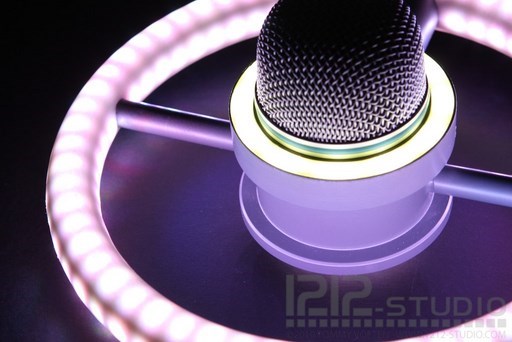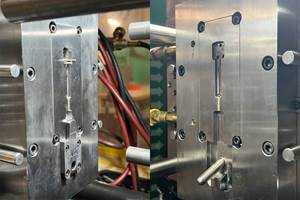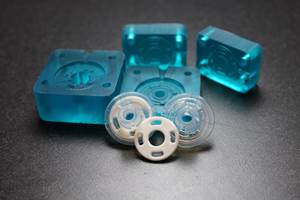3D Printing Took Center Stage At U2 Tour
A custom LED-illuminated microphone for Bono, created by the Dimension 3D Printer. 3D printing lends itself to some pretty cool and interesting stories and Plastic Technology’s Lilli Sherman recently sent one my way that involves the band U2.

A custom LED-illuminated microphone for Bono, created by the Dimension 3D Printer.
3D printing lends itself to some pretty cool and interesting stories and Plastic Technology’s Lilli Sherman recently sent one my way that involves the band U2. Apparently 3D printing helped to build LED fixtures for U2's 360 Tour using a Stratasys printer. If you recall, the U2 360 tour was massive, both in stage structure and the fact the group visited stadiums from 2009-2011. So this was no small project. Here’s how 3D printing had a hand in the show:
In April 2009, Tommy Voeten, president of NY-based 1212-Studio, was asked to help illuminate the fabric roof of the stages for the tour, according to a case study from Stratasys. 1212-Studio specializes in custom design and innovation of LED illumination products for the architectural and entertainment markets.
According to the case study, this was quite a challenge. The 360 Tour would contain three identical stages, each holding 36 orange pods, called “polyps,” on the roof. Each polyp would hold eight pieces of illuminating LED fixtures to light the roof fabric in millions of colors. A total of nearly one thousand custom fixtures had to be designed, manufactured and delivered within four weeks. Voeten used the Dimension BST 1200es 3D Printer from Stratasys to create the fixtures.
"The innovative LED illuminating fixture required proof of concept," Voeten said. "Optical and thermal simulation tools are fantastic for saving time and are incredibly accurate, but we still wanted to see the light distribution with our eyes. We wanted to hold a physical model in our hands before we started manufacturing."
The Dimension-produced functional prototype helped to demonstrate proof of concept to the other team members. Three days after the printer began creating the part, Voeten flew to the United Kingdom to meet the team for final approval. The next day, the design went into full production.
Dimension 3D Printers use FDM technology, a method of additive technology that works by putting down layers of thermoplastic materials to create a prototype.
The production of nearly one thousand U2BEs became an international venture. The units were designed in New York City, the optics also came from New York, LED electronics and drivers were custom made in the United Kingdom, and the housing was manufactured and assembled in Belgium.
The entire design for a stage LED lighting fixture, U2BE, simulation and validation were completed in eight days.
In addition, after successfully completing the LED polyp project, Voeten received a second request from U2. He was asked to build a custom LED-illuminated microphone for Bono that was to be suspended from a steel cable, enabling Bono to swing from the microphone, which was named the U2MIC. Voeten said that Bono's microphone was a much more complicated design and manufacturing challenge because of how it was going to be used on tour. He again used the Dimension 3D Printer and his team was able to print several design iterations and sections of the microphone in order to examine and optimize the pressure points and light distribution within the rings and between all the components. Voeten was so satisfied with the quality and strength of the printed FDM parts, he optimized the design so they could be used as final parts on the U2MICs.
The final illuminating ring was composed of two FDM shells that are assembled together. The simple and smooth exterior shape belies the complex interior shape, which consists of a support structure to divide pressure among the electronics and LED components without hindering the light transmission of the shell design itself. The ring design had to be strong enough to hold the pressure of a full body weight without deflecting and crushing the internal components.

"The ABSplus material did a phenomenal job with strength and finish," Voeten said. "It made all the difference. It was strong, and we could finish it to perfection."
If the rings had been manufactured with traditional Computer Numerical Control (CNC) technology, it would have taken several hours per shell for the cutting, and additional work holding tools would have been necessary to fabricate the parts. This was eliminated by using the FDM process, resulting in lower part costs. "We saved thousands of dollars and weeks of tooling by eliminating CNC cutting of the parts, design time for work holding and additional tooling," said Voeten.
Besides the illuminating ring, a separate compartment was printed by the Dimension printer to hold all of the electronic parts, batteries and other components included in the microphone. For the assembly of the U2MIC units, alignment and assembly tools were printed to simplify the assembly and to increase the consistency between the custom units.
Related Content
3D Printing of Injection Molds Flows in a New Direction
Hybrids of additive manufacturing and CNC machining can shorten tooling turnaround times.
Read MoreAdditive Technologies for Injection Mold Tooling Ride Tailwinds
NPE2024: Lowering barriers to additive manufacturing adoption in toolmaking.
Read MoreFreeform Injection Molding Eases the Path to Medical Device Product Testing
A development and manufacturing service provider is using dissolvable molds to build injection molded silicone prototypes.
Read MoreNPE 2024: Additive Manufacturing Assisting, Advancing Plastics Processing
Exhibitors and presenters at the plastics show emphasized 3D printing as a complement and aid to more traditional production processes.
Read MoreRead Next
For PLASTICS' CEO Seaholm, NPE to Shine Light on Sustainability Successes
With advocacy, communication and sustainability as three main pillars, Seaholm leads a trade association to NPE that ‘is more active today than we have ever been.’
Read MorePeople 4.0 – How to Get Buy-In from Your Staff for Industry 4.0 Systems
Implementing a production monitoring system as the foundation of a ‘smart factory’ is about integrating people with new technology as much as it is about integrating machines and computers. Here are tips from a company that has gone through the process.
Read MoreMaking the Circular Economy a Reality
Driven by brand owner demands and new worldwide legislation, the entire supply chain is working toward the shift to circularity, with some evidence the circular economy has already begun.
Read More


























